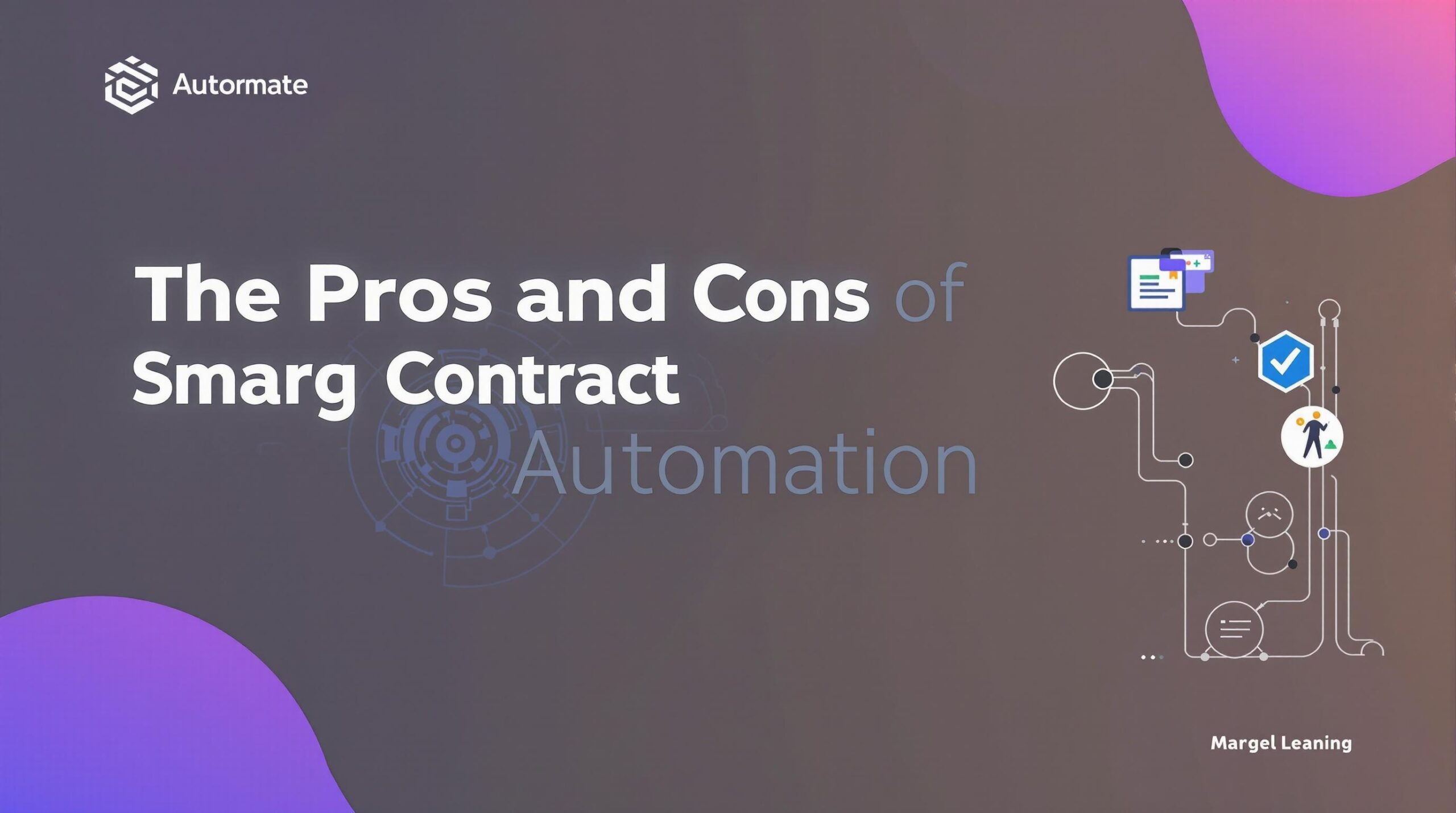Introduction to Smart Contracts and Their Automation
Smart contracts are self-executing contracts where the terms between parties are embedded in digital code, offering a revolutionary approach to automating transactions. This automation process is a game-changer, especially within the burgeoning digital landscape of Africa, promising both efficiency and transparency. But what exactly are smart contracts, and how do they play a role in automation?
What is a smart contract? A smart contract is a self-executing contract with terms of agreement directly written into lines of code, enabling automated and trustless transactions on a blockchain.
By exploring the fundamental workings of these digital contracts, we can understand how they minimize the need for intermediaries, thereby streamlining processes significantly. This characteristic is particularly beneficial in African markets like Nigeria, where the adoption of blockchain-based solutions is on the rise. Smart contracts pave the way for various innovative applications by reducing costs and enhancing transactional speed.
The Evolution of Automation in Blockchain
The journey of automation in blockchain reflects a significant shift from traditional methods to a more streamlined and efficient approach. Historically, the need for multiple intermediaries such as brokers and agents slowed down transaction processes, often leading to higher costs and extended wait times. The ascent of blockchain technology, however, has redefined this narrative.
In Africa, smart contracts offer a unique opportunity to address longstanding challenges in key sectors like finance, healthcare, and supply chain management. For instance, applying smart contracts in supply chains can eliminate the cumbersome paper trails and potential for fraud, enhancing transparency and security. Moreover, in the financial services sector, these digital contracts enable automatic execution of transactions upon meeting predefined conditions, which is a tremendous leap forward.
- Finance Sector: Smart contracts automate complex financial transactions, reducing the need for intermediaries and speeding up processes.
- Healthcare: Secure management and sharing of patient records are streamlined through blockchain technology, enhancing privacy and efficiency.
- Supply Chain Management: By automating inventory checks and payments, smart contracts reduce the risk of fraud and errors, ensuring a smoother workflow.
Understanding these innovations is crucial for recognizing how Africa’s market can leverage smart contracts for economic growth and development. As these technologies continue to evolve, further integration into daily business processes is expected, magnifying their impact across the continent.
“Jara- Unlocking the Future to Africa’s Crypto Ecosystem.”
Platforms like Jara are leading the charge in this digital revolution. By implementing their proprietary Layer 2 blockchain and integrating the $JARA token into the ecosystem, Jara provides a comprehensive infrastructure designed to facilitate seamless, efficient, and secure transactions that bridge global capital with African assets. This strategic move highlights the potential of smart contracts to reshape industries and empower users by granting them greater independence and control over their digital interactions. With these advances, Africa stands at the forefront of the blockchain and digital asset revolution.
Advantages of Using Smart Contracts
Smart contracts are rapidly transforming the landscape of automated transactions across various sectors, particularly in Africa. With their capacity to execute transactions without intermediaries, they offer a unique blend of security, efficiency, and cost savings. Imagine traditional contracts, cumbersome and time-consuming, evolving into fast, reliable digital agreements. This is where smart contracts excel, enhancing operational efficiencies and bridging gaps in trust and accountability.
Security and Efficiency in Transactions
One of the primary advantages of smart contracts is their ability to execute transactions with enhanced security and efficiency. These digital contracts are designed to uphold the agreed terms under any circumstances, without the interference of third parties. How does this eliminate the risks involved in manual contracts?
Smart contracts ensure transparency by logging every transaction in a blockchain, rendering the process traceable and immutable, thus minimizing the risk of fraud.
The implementation of smart contracts in Africa holds promising potential. By cutting down intermediaries, not only do smart contracts offer significant cost reductions, but they also expedite processes, ensuring that transactions are quicker and free from human-induced errors. When financial and logistical processes are automated, businesses revel in efficiency.
- Supply Chain Efficiency: The logistics sector in Africa can benefit immensely from smart contracts by automating payments and inventory management, thus reducing delays and enhancing operational flexibility.
- Cross-Industry Impact: From healthcare to finance, diverse industries are leveraging smart contracts for transaction and process automation, ensuring operations are seamless and reliable.
In the African economic landscape, where accessibility to technology can often pose a challenge, smart contracts offer an innovative solution that aligns with the continent’s digital transformation objectives. As articulated by blockchain technology, these contracts remove bottlenecks, offering a neutral ground where all parties can engage with confidence.
Cost Savings and Reliability
Are smart contracts truly cost-effective? Absolutely. By removing the need for intermediaries such as brokers or agents, smart contracts inherently reduce the transaction costs involved in traditional contract executions. They ensure that funds are automatically transferred only when contractual terms are satisfied, thereby avoiding any potential for disputes or delays associated with manual oversight.
By leveraging blockchain technology, smart contracts minimize operational costs and streamline complex transaction processes.
Reliability is further enhanced as every transaction’s details are stored within the blockchain, negating disputes about payments and obligations. This level of transparency ensures each party is aware of the progress of their transaction, fulfilling the promise of automation that current systems may lack.
- Legal Considerations: Understanding the legal binding nature of smart contracts can offer users confidence and capitalize on savings while navigating regulatory requirements.
- Reduction of Gas Fees: Optimizing transactions within smart contracts can lead to reduced gas fees, making blockchain applications more attractive for African markets.
In Africa, where financial inclusion is critical, the introduction of Decentralized Finance (DeFi) showcases smart contracts as pivotal tools in extending banking and financial services to untapped markets. This accessibility opens new horizons for economic participation, empowering individuals and businesses to thrive in a digitally integrated world.
“Jara – Unlocking the Future to Africa’s Crypto Ecosystem” offers significant advantages through smart contracts, bridging global capital to African assets.
Understanding these advantages highlights the potential of bridging technological advancements with tangible economic benefits for Africa. As industries increasingly adopt these automated solutions, they are poised to not only enhance operational efficiencies but also drive significant economic growth across the continent.

Drawbacks and Challenges of Smart Contracts
Despite the numerous transformative advantages of smart contracts, they are not without their challenges. One must consider the rigidity inherent in these digital agreements. In traditional contracts, the human touch allows for negotiation and flexibility, adapting the terms as circumstances change. However, smart contracts, once coded, are immutable. This might remind you of writing with a permanent marker – no room for changes without significant effort or cost.
What are smart contract limitations? Smart contracts face issues like inflexibility, potential for loopholes, and difficulty in correcting errors once deployed.
This rigidity can become a formidable barrier when you realize that any error in coding can lead to costly disputes. Correcting these errors requires a level of technical expertise that may not be readily available, particularly in regions just beginning to harness smart contracts as a valuable tool for development.
Technical and Legal Limitations
The integration of smart contracts into mainstream applications reveals both technical and legal limitations that pose significant hurdles. Firstly, the technical complexity of creating a smart contract requires sophisticated programming expertise. For laypersons and even seasoned business operators without a tech background, this can be daunting. Imagine trying to repair a complex machine with no technical manual – tricky, right?
Legally, the status of smart contracts remains a gray area in many jurisdictions. As you ponder this, consider the analogy of stepping into a void without knowing if there’s ground beneath your feet. The uncertainty of legal recognition and enforcement across borders adds another layer of complication.
- Inflexibility: Once a smart contract is deployed on the blockchain, it cannot be changed, making it challenging to accommodate evolving conditions or errors.
- Potential for Loopholes: The explicit nature of code can lead to vulnerabilities if any oversight or misunderstanding exists within the defined conditions.
- Legal Ambiguity: As a new form of agreement, smart contracts sometimes lack clarity in terms of legal recognition and enforceability.
Furthermore, industries that demand regular updates and contractual revisions find these limitations particularly restrictive. In sectors such as healthcare or supply chain management, flexibility is key, and smart contracts may hinder rather than help if they remain unchangeable in the face of shifting needs and regulations.
In Africa, where digital innovations are heralding a new era of financial inclusion and economic empowerment, the adoption of smart contract technology is significant. However, overcoming these technical and legal challenges is crucial for their successful integration and widespread use.
“By embracing $JARA and its ecosystem, Africa stands on the brink of a digital revolution poised to harness the immense potential of smart contracts to bridge global capital with African assets.”
To navigate these waters effectively, entities like Jara are emerging as pivotal players. By providing a comprehensive platform featuring a multi-chain wallet and AI-powered influencers, Jara not only addresses the technological gap but also offers strategic insights into leveraging smart contracts within a robust regulatory framework.
In essence, while smart contracts offer groundbreaking advancements, understanding their limitations and preparing strategically to mitigate these risks will empower stakeholders to harness their full potential. This preparation involves recognizing and overcoming the technical and legal challenges to ensure seamless integration and functionality in real-world applications.
Practical Applications and Future Outlook
Smart contracts are increasingly becoming a vital part of modern technological applications. These digital agreements hold significant promise across various sectors such as government, healthcare, and finance. As the underlying technology evolves, there’s heightened interest in how smart contracts can drive efficiency and foster innovation on a global scale. This article explores the practical applications of smart contracts and examines the future trends that may shape their development.
Emerging Trends in Smart Contract Technology
As smart contract technology continues to advance, we anticipate the emergence of several key trends. One notable trend is the development of more adaptable contract models. These flexible frameworks aim to integrate better with existing legal structures, thereby broadening the adoption and utility of smart contracts across industries.
In addition, there’s a growing focus on ensuring the security and reliability of smart contracts. Developers are actively working to mitigate vulnerabilities, which is paramount given the immutable nature of these digital agreements. Enhancements in AI and blockchain interoperability are also expected to streamline the automation of various processes, thus expanding the scope of smart contracts beyond their current capabilities.
What role do smart contracts play in automation? Smart contracts automate the execution of contract terms by leveraging blockchain technology, eliminating the need for intermediaries and reducing transactional costs.
- Government Voting System: Smart contracts can make voting systems more secure and less prone to manipulation. By securely storing votes on the blockchain, these contracts can enhance transparency and efficiency in electoral processes.
- Healthcare Sector: In the healthcare industry, smart contracts can facilitate secure management and sharing of patient data, ensuring that only authorized individuals have access. This leads to better patient privacy and streamlined healthcare services.
- Supply Chain Management: By automating various supply chain operations, smart contracts can minimize fraud risks associated with traditional paper systems. They can efficiently manage inventories and automate payments to improve operational efficiency.
- Financial Services: The financial sector benefits significantly from smart contracts, as they streamline processes like insurance claims and trade settlements. By automating these tasks, smart contracts reduce the need for intermediaries and increase efficiency.
As these industries continue to adopt smart contracts, the resulting improvements will significantly alter how businesses operate. With further technological advances, the barriers to entry for smart contract use are expected to decrease, paving the way for more widespread adoption.
“Jara- Unlocking the Future to Africa’s Crypto Ecosystem.”
Future Innovations and Market Potential
Looking to the future, the market potential for smart contracts is enormous. Africa, with its rapidly growing digital economy, presents a unique opportunity for innovations in smart contract applications. As platforms like Jara expand their infrastructure to bridge global capital to African assets, we are likely to see a surge in the use of smart contracts for a variety of digital asset transactions.
Platforms like Jara are investing in cutting-edge blockchain solutions and tokenization projects, such as the $6 billion Lagos airport bond. By fueling Africa’s digital asset ecosystem, they aim to enhance financial inclusion and economic empowerment through secure and efficient smart contract transactions.
Moreover, the integration of smart contracts with AI applications promises to accelerate automation and innovation. This fusion could lead to smarter, more efficient systems that benefit businesses and communities worldwide.
In conclusion, the practical applications and future outlook of smart contracts indicate a promising future. By continuously improving and adapting to emerging trends, these digital agreements are poised to revolutionize various industries, offering innovative solutions to challenges across the globe.

How do smart contracts simplify business processes?
Smart contracts simplify business processes by automating traditional contract functions through blockchain technology. They reduce the need for intermediaries, thus cutting down costs and processing times. This automation ensures that transactions are completed promptly when predetermined conditions are met.
What industries benefit most from smart contracts?
Industries that benefit most from smart contracts include finance, healthcare, real estate, and supply chain management. These industries gain efficiency, security, and transparency as smart contracts streamline processes and enhance compliance without the need for manual intervention.
Are smart contracts legally binding?
Smart contracts are often considered legally binding, provided they meet the legal criteria of a traditional contract such as offer, acceptance, and consideration. However, the legal recognition of smart contracts varies by jurisdiction, so it’s crucial to consult with legal experts for specific implementations.
How do smart contracts reduce transaction fraud?
Smart contracts reduce transaction fraud by operating on a decentralized and tamper-proof blockchain network. This transparency ensures that all parties can see every transaction, making it difficult to alter records without detection. Additionally, automated enforcement of rules eliminates the potential for human error or manipulation.

Related Practice Areas
Explore our additional practice areas closely linked to smart contracts and automation, offering you a comprehensive understanding of related subjects and their implications.
Discover What Our Clients Are Saying
At the forefront of our Smart Contracts & Automation practice is a deep-seated commitment to client satisfaction. Each case is handled with utmost care, as echoed in the appreciative feedback from those we represent.

Take Control of Your Future with Smart Contract Solutions
Are you ready to harness the power of automation through smart contracts? At Jara, we bridge global capital to African assets, leveraging technology to ensure seamless transactions and robust security. Our team is committed to guiding you through the complexities of smart contract implementation, empowering your business with cutting-edge solutions.
“Your Voice, Our Mission” – We champion your success with innovative legal technology and strategic expertise.
Discover how Jara can help elevate your business to new heights. Get started by exploring our comprehensive solutions today!
Visit Jara | Email Us | Download Jara App on Android | Download Jara App on iPhone
“Your Voice, Our Mission” – we champion your rights with the tenacity and dedication that has earned us the trust of our community members.
Understanding Smart Contracts
Smart contracts are self-executing contracts with the terms of the agreement between buyer and seller being directly written into lines of code. They are designed to automate processes and reduce the need for intermediaries.
Pros of Using Smart Contracts for Automation
- Efficiency: Smart contracts automate processes, leading to faster execution of agreements without the need for human intervention.
- Cost Savings: By eliminating intermediaries, smart contracts can significantly reduce fees associated with traditional transactions.
- Transparency: All parties involved can view the terms of the contract, resulting in less likelihood of disputes.
- Security: Smart contracts are encrypted and decentralized, providing enhanced security against data breaches.
Cons of Using Smart Contracts for Automation
- Lack of Flexibility: Once deployed, smart contracts are difficult to alter, which can be problematic if conditions change.
- Technical Complexity: Designing and implementing smart contracts require technical skills and expertise.
- Legal Considerations: The enforceability of smart contracts can vary based on jurisdiction, potentially leading to legal complications.
- Potential for Bugs: Coding errors can exist, and since smart contracts are immutable, these errors can have significant repercussions.
Important: Always consult a legal expert to ensure smart contracts are suitable for your specific case and compliant with local regulations.
Key Features of Smart Contracts
| Feature | Description |
|---|---|
| Automation | Automatically execute actions when predefined conditions are met. |
| Reliability | Once deployed, smart contracts will always operate as programmed. |
| Trustworthy Transactions | Reduce the need for trust between parties due to transparency and verification. |
What Industries Benefit the Most?
Industries such as finance, real estate, and supply chain management are poised to gain significantly from the integration of smart contracts due to their reliance on transparent, efficient transactions.

















